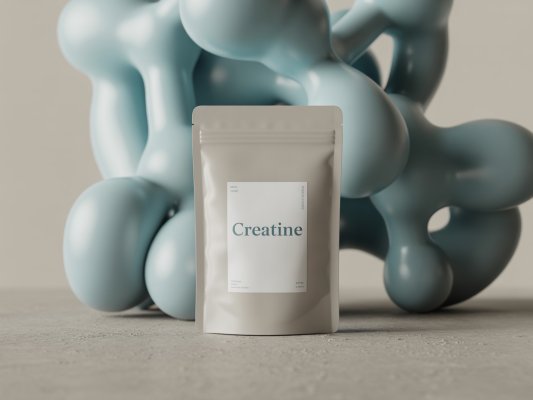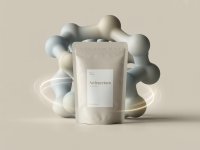
Creatine
Description
Creatine, a naturally occurring compound in the body, is increasingly recognized for its potential cognitive benefits beyond its well-known role in muscle performance. This article provides a comprehensive yet accessible overview of creatine, exploring its impact on brain health, dosage, side effects, and more, designed to empower informed decisions. Whether you're a seasoned supplement user or just curious, this is your go-to resource.
Quick Overview: Creatine At-a-Glance
- Key Benefit(s): Enhanced memory and processing speed, increased cellular energy.
- Primary Mechanism: Replenishes ATP (adenosine triphosphate) in brain cells, the primary energy source.
- Best For: Individuals seeking to improve cognitive function, especially memory and processing speed, and those experiencing mental fatigue.
- Typical Dose Range: 3-5 grams daily; loading phase optional.
- Key Caution/Consideration: Generally safe; may cause water retention in some individuals.
Table of Contents
Categories & Effectiveness
Learn about our rating methodologyBrain Health
Neuro-Repair Support
4/10Moderate evidence of effectiveness
Cognition
Memory & Recall
7/10Strong evidence of effectiveness
Processing Speed
4/10Moderate evidence of effectiveness
Concentration & Focus
2/10Limited evidence of effectiveness
Energy & Alertness
Cellular Energy (ATP)
7/10Strong evidence of effectiveness
Dosage & Side Effects
Recommended Dosage
Potential Side Effects
Bioavailability & Half-Life
Interactions & Stacks
Recommended Products
ESN Ultrapure Creatine Monohydrate, 300 Kapseln, 100 Portionen, Kreatin Kapseln, mikrofein & perfekt löslich, vegan - made in Germany
- Rated 4.6 stars by 2,232 customers
- Special offer: 10 % Rabatt auf deine erste Abonnement-Bestellung
GymBeam Kreatin Monohydrat Pulver - 100% Reines Kreatin-Monohydrat, ideal für Kraft- und Mannschaftssportler, gut lösliches Pulver, beliebt bei Kraftsportlern und HIIT-Fans (1000 g, Unflavored)
- Rated 4.6 stars by 18 customers
- Premium quality ingredients
Creatin Monohydrat Pulver 500g | 100% kreatin monohydrat pulver in Mikronisiert | Geschmacklos | Inklusive Spender | Optimale Löslichkeit | Vegan | Gmo Free
- Rated 4.5 stars by 4,509 customers
- Premium quality ingredients
As an Amazon Associate we earn from qualifying purchases. Prices and availability are accurate as of the date/time indicated and are subject to change.
Benefits by Use Case
Enhanced Memory
Creatine supplementation can improve memory recall and recognition, particularly in tasks requiring short-term memory. This benefit is attributed to increased ATP availability in the brain, supporting neuronal function. Best for those looking to improve working memory.
Improved Processing Speed
Some studies suggest creatine can enhance processing speed, leading to quicker reaction times and improved cognitive performance in tasks requiring rapid decision-making. This effect may be more pronounced in individuals experiencing sleep deprivation or mental fatigue. Best for those looking to improve reaction time.
Reduced Mental Fatigue
Creatine may help reduce mental fatigue, allowing for sustained focus and cognitive performance during prolonged mental tasks. This is particularly beneficial for individuals engaged in demanding cognitive activities or experiencing chronic fatigue. Best for those seeking to improve mental endurance.
neuroprotection
Creatine has shown potential neuroprotective properties, which may help protect brain cells from damage and degeneration. This suggests a possible role in preventing or mitigating the effects of neurodegenerative diseases, but more research is needed. Key for those looking for brain health.
Mechanism of Action
Frequently Asked Questions
Where to Buy Creatine
Based on quality, price, and customer reviews, here are our top recommended Creatine supplements:
Creatin Monohydrat Tabletten - 3000mg pro Portion - 270 Kreatin Vegan Tablets - 3 Monate Vorrat - Creatine - Alternative zu Kapseln & Pulver - Frei von Gluten & Magnesiumstearat - WeightWorld
- Rated 4.3 stars by 5,491 customers
- Premium quality ingredients
Creatin Monohydrat Pulver 500g | 100% kreatin monohydrat pulver in Mikronisiert | Geschmacklos | Inklusive Spender | Optimale Löslichkeit | Vegan | Gmo Free
- Rated 4.5 stars by 4,509 customers
- Premium quality ingredients
ESN Ultrapure Creatine Monohydrate, 300 Kapseln, 100 Portionen, Kreatin Kapseln, mikrofein & perfekt löslich, vegan - made in Germany
- Rated 4.6 stars by 2,232 customers
- Special offer: 10 % Rabatt auf deine erste Abonnement-Bestellung
As an Amazon Associate we earn from qualifying purchases. Prices and availability are accurate as of the date/time indicated and are subject to change.
Summary & Expert Opinion
For those interested in a deeper dive, let's explore the nuanced mechanisms and research findings in more detail. Creatine's impact on cognitive function extends beyond simple ATP replenishment. It interacts with various neurotransmitter systems and cellular processes, influencing brain plasticity and resilience.
- Adenosine Receptors: While caffeine is a direct adenosine receptor antagonist, creatine's indirect influence on energy homeostasis may modulate adenosine signaling, potentially affecting sleep and alertness.
- Glutamate Levels: Some research suggests that creatine supplementation may lower brain glutamate levels, which could be beneficial in conditions with glutamate excitotoxicity, such as Huntington's disease.
- Mitochondrial Function: Creatine's role in ATP production is closely linked to mitochondrial function. By optimizing energy metabolism, creatine may support mitochondrial health and protect against oxidative stress, particularly in aging brains.
- Genetic Factors: Individual responses to creatine can vary due to genetic factors influencing creatine transport and metabolism. While CYP enzymes are more relevant for caffeine metabolism, genes related to creatine synthesis and transport may play a role in individual responses to creatine supplementation.
- Long-Term Effects: While generally safe, long-term creatine supplementation requires careful monitoring, especially in individuals with pre-existing kidney conditions. More research is needed to fully understand the long-term effects on brain health and cognitive function.
- Conflicting Studies: Some studies show mixed results regarding creatine's impact on complex cognitive domains like executive function. These discrepancies may be due to variations in study design, dosage, participant characteristics, and cognitive tasks used.
In conclusion, creatine is a valuable tool for supporting brain health and cognitive function, but it's essential to manage expectations and consider individual factors. For those seeking a safe and accessible cognitive enhancer, creatine is worth exploring, but it's not a substitute for a healthy lifestyle and a balanced diet.








